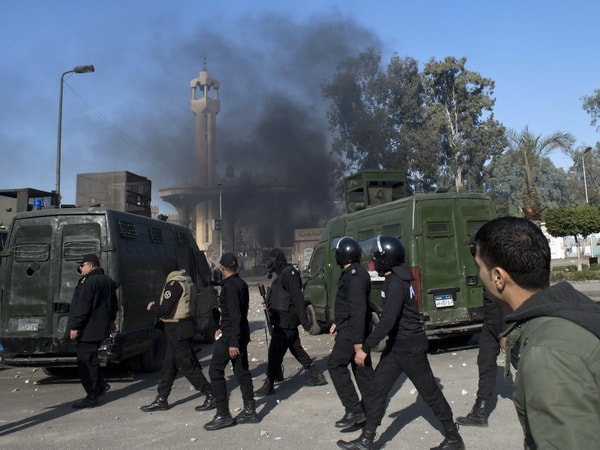Egypt's New Constitution: A Vote for Stability
On January 14-15, Egyptian voters in the country will go to the polls in a referendum on a draft revised constitution - the first step in Egypt's political transition since the coup that overthrew President Mohamed Morsi more than 6 months ago.
On January 14-15, Egyptian voters in the country will go to the polls in a referendum on a draft revised constitution - the first step in Egypt's political transition since the coup that overthrew President Mohamed Morsi more than 6 months ago.
According to Egypt's Central Election Commission, nearly 53.5 million people out of a total population of 85 million are eligible to vote, an increase of more than 1.5 million voters compared to the constitutional referendum held in December 2012.
 |
| Egyptian riot police patrol an area east of Cairo on December 27. (Source: AFP/VNA) |
| RELATED NEWS |
|---|
About 14,000 judges, nearly 7,000 observers from 59 domestic and foreign non-governmental organizations and 7 international organizations such as the Arab League and the European Union will participate in monitoring the voting process.
160,000 soldiers and 100,000 police from combat units and armed reserve forces will be mobilized to protect polling stations and key facilities nationwide.
The process of drafting a new constitution in Egypt went quite smoothly, starting in early September and ending on December 1, 2013 after four controversial articles of the final draft constitution were approved.
With a total of 247 articles, the draft amended constitution is considered by public opinion to better ensure the basic rights of the people and the separation of powers between Egypt's executive, legislative and judicial branches.
Although it took place quite late compared to the 6-month schedule outlined by interim President Atly Mansour on July 8, this vote shows that the political transition roadmap in Egypt is on track, despite the escalating wave of violence.
This particularly important event is expected by many people to create the premise to end the serious crisis with the bloodiest chapters in the 5,000-year history of the land of the Pyramids, and at the same time open a period of stable development in this North African country after nearly 3 years of suffering the "Arab Spring" earthquake.
The vote took place amid growing security instability with a series of attacks by Islamist extremists on security forces, as well as violent protests that have taken place almost daily since the military ordered the ouster of President Mohamed Morsi of the Muslim Brotherhood (MB) in early July.
More than 2,700 people have been killed in political violence, ethnic clashes and terrorist attacks in the post-Morsi period.
Labeling the Brotherhood as a terrorist organization — the 85-year-old, best-organized force in Egypt that has won every election since the overthrow of former President Hosni Mubarak — gives the government a stronger mandate to crack down on its members.
Public opinion is really concerned that being marginalized will be the driving force to push the wave of violent protests by the Islamists to rise and make them devote all their efforts to the "do-or-die" fight against the "coup" government.
Therefore, the referendum is considered an important test for the Egyptian government.
If the authorities succeed in running a free and transparent vote without any security incidents, they could claim victory in their fight against the MB, who have been relentlessly campaigning to boycott the election or vote against the new constitution.
Moreover, if the new constitution is approved with a much higher approval rate and turnout than the constitutional vote held in late 2012, this result will strengthen the legitimacy of the "revolution" of June 30, and at the same time be a passport for liberal and secular forces to take power "rightfully" after the presidential and parliamentary elections scheduled to take place before mid-year.
That would mean a tragic end for the MB and its hardline loyalist allies.
Their political future is virtually over after being overthrown by the military according to "the will of the people" and suffering another "convincing" defeat in this vote.
According to analysts, the above possibility is entirely possible. The results of the two most recent public opinion polls show that nearly 80% of respondents are ready to vote and over 70% of voters will support the new constitution, which is considered to be much superior to the previous constitution drafted by the Islamists.
In addition, voter turnout is also expected to be higher thanks to the recent amendment to the Political Rights Law, which allows voters to vote outside their registered residential area.
On the other hand, after nearly three years of political, religious and ethnic unrest and violence, Egyptian voters are placing high hopes on stability.
Moreover, "Full rice, warm clothes" or "Freedom, bread and social justice" are the most immediate desires of the people of the land of the Pyramids, not the extremist religious agendas of Islamic forces./.
According to VNA
